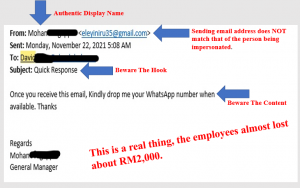In the realm of pressing matters, timely responses are crucial. Have you recently received an email with a subject line suggesting an urgent situation, possibly originating from a manager or department head? These initial emails often mark the onset of a potential scam, with scammers aiming to manipulate recipients into taking immediate action.
These deceptive emails commonly exhibit certain traits that can help in recognition and self-protection:
**1. Brief, Urgent Subjects and Messages:** These emails typically feature concise subject lines like “Are you available?” or “Urgent favor,” accompanied by succinct messages intended to evade spam and phishing filters.
**2. Impersonation of Familiar Individuals:** Scammers often assume the identity of someone known to the recipient, often a person in a position of authority, to enhance the credibility of their deception.
**3. Urgent Tone:** These emails create a sense of urgency, urging the recipient to respond promptly.
**4. Discrepancies in Email Addresses:** The sender’s email address usually does not align with the person they claim to be, and the Reply-To email address often differs from the sender’s address.
To fortify your defenses against such scams, consider these preventive measures:
**1. Exercise Caution with Urgent Requests:** Approach communications with urgent requests from executives with caution, especially if the communication style is atypical.
**2. Validate Sender’s Email Addresses:** Scrutinize the sender’s email address to ensure it matches the claimed identity.
**3. Establish Direct Contact:** Instead of replying directly to the email request, reach out to the purported sender through alternative means, such as a phone call, chat, or in-person conversation, if you harbor doubts about the request’s legitimacy.
**4. ยืนยันผ่านช่องทางที่เชื่อถือได้:** ส่งอีเมลไปยังที่อยู่อีเมลที่รู้จักและใช้โดยทั่วไปของบุคคลนั้น เพื่อยืนยันความถูกต้องของคำร้องขอ
**5. ตั้งคำถามกับคำขอทางการเงินที่ผิดปกติ:** ควรตรวจสอบและยืนยันทุกครั้งเมื่อพบคำขอที่ผิดปกติเกี่ยวกับธุรกรรมทางการเงิน เช่น การโอนเงินผ่านธนาคาร หรือบัตรของขวัญ โดยเฉพาะหากดูเหมือนว่าคำขอนั้นมาจากผู้บังคับบัญชาหรือผู้นำ
ผู้หลอกลวงใช้ความรู้สึกเร่งด่วนที่สร้างขึ้นเท็จๆ เพื่อเพิ่มประสิทธิภาพในการหลอกลวงในที่ทำงาน พวกเขารู้ดีว่าบุคคลทั่วไปมักให้ความสำคัญและตอบสนองอย่างรวดเร็วต่อคำขอที่ดูเร่งด่วน โดยเฉพาะหากดูเหมือนว่ามาจากผู้บริหารหรือเพื่อนร่วมงาน
การรักษาท่าทีระมัดระวังต่อการสื่อสารดังกล่าวมีความสำคัญอย่างยิ่ง การตรวจสอบความถูกต้องของคำขอเพื่อป้องกันตนเองจากภัยการหลอกลวง แม้ว่าจะต้องตั้งคำถามต่อความน่าเชื่อถือของการสื่อสารจากเพื่อนร่วมงานที่อาวุโสกว่า ก็ยังเป็นทางเลือกที่ฉลาดกว่า
เราสนใจที่จะเรียนรู้เกี่ยวกับมาตรการป้องกันที่คุณได้นำไปใช้เมื่อพบกับการหลอกลวงลักษณะนี้ ความคิดเห็นของคุณสามารถช่วยให้ผู้อื่นตระหนักและปลอดภัยในการติดต่อสื่อสารทางออนไลน์มากยิ่งขึ้น

